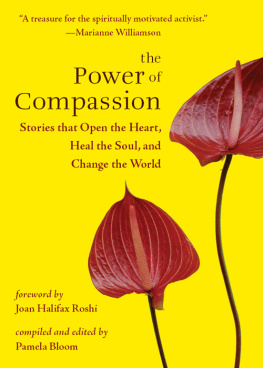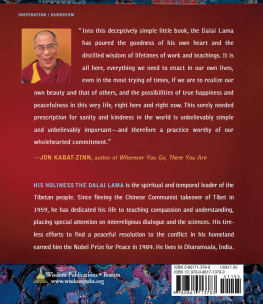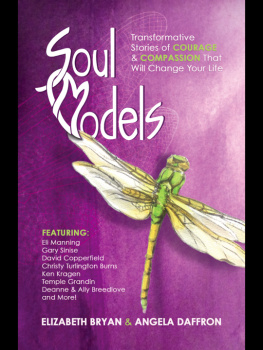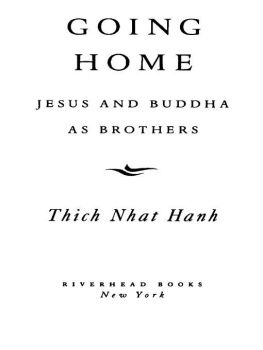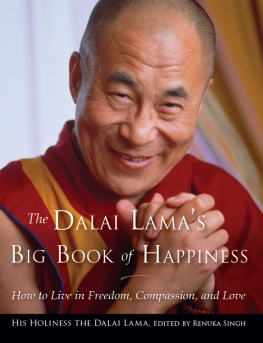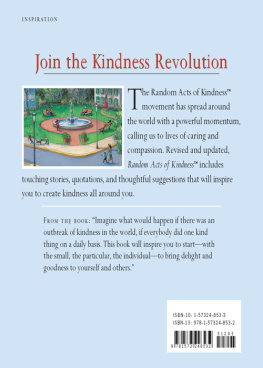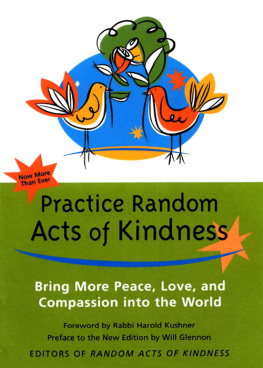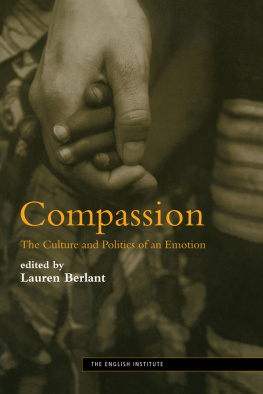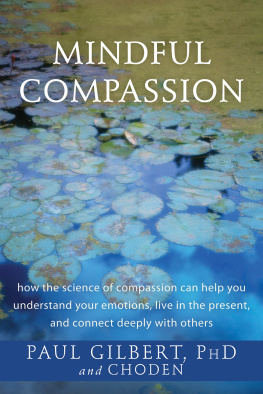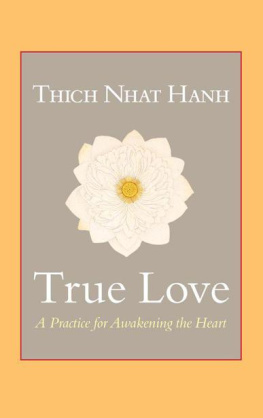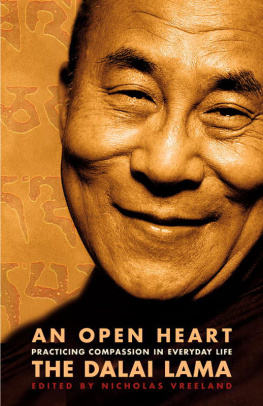
Praise for The Power of Compassion
Compassion arises through ceaseless manifestations, as the stories collected in this book demonstrate. Through their lucid and memorable insights, these stories lead us to one fundamental truth: Compassion is the essence of all authentic spirituality and transcends any definitions and differences of religions.
HIS EMINENCE CHAGDUD TULKU RINPOCHE,
author of Lord of the Dance and
Gates to Buddhist Practice
Pamela Bloom believes that compassion is contagious. May it be so, because the marvelous stories she's collected in this book could unleash a welcome epidemic. From the horrors of war to the annoyances of everyday life, these true tales speak to the power within us to transform painful experiences into blessings.
ROBERT OWENS SCOTT, Editor-in-Chief,
Spirituality & Health magazine
[A] must-read for all people seeking the healing experience of Universal Oneness. Through each story, one is called to open oneself to the foundational truths of the Buddhist approach to life, namely kindness and compassion, which, incidentally, are the same foundations of all spiritual paths.
RON ROTH, PH.D., author of
Holy Spirit: The Boundless Energy of God
Pamela Bloom knows that the only way to understand compassion is to feel it. Stories and not theories are what awaken the compassionate nature in each of us because to know the truth is informative but to feel it is transformative.
REV. AUGUST GOLD, Staff Minister,
Unity Church of New York
Pamela Bloom's The Power of Compassion is heroic. Each inspiring story savors people, who, facing enormous challenges, prevail moment to moment with truly oceanic compassion.
GARNETTE ARLEDGE, M.DIV.,
Hospice Chaplain, PBS Coordinator to Bill Moyers

This edition first published in 2010 by
Hampton Roads Publishing Company, Inc.
Charlottesville, VA 22906
www.hrpub.com
Copyright 2000 by Pamela Bloom.
All rights reserved. No part of this publication may be reproduced or transmitted in any form or by any means, electronic or mechanical, including photocopying, recording, or by any information storage and retrieval system, without permission in writing from Hampton Roads. Reviewers may quote brief passages. Originally published as Buddhist Acts of Compassion in 2000 by
Conari Press, ISBN: 1-57324-523-2.
Permissions appear on page 237.
ISBN: 978-1-57174-629-0.
Library of Congress Cataloging-in-Publication Data available upon request.
Cover design: Donna Linden
Interior design: Kathryn Sky-Peck
Cover photograph ImageState / Flower Power / Still Life Collection
Typeset in Bembo
Printed in the United States of America
VG
10 9 8 7 6 5 4 3 2 1
The paper used in this publication meets the minimum requirements of the American National Standard for Information SciencesPermanence of Paper for Printed Library Materials Z39.48-1992 (R1997).
To my parents,
who transmitted to me
the genes of compassion,
and to my teachers,
who nourish them

By the power and truth of these teachings
May all beings enjoy happiness and the causes of happiness
Be free from sorrow and the causes of sorrow
May they never be separated from the sacred happiness
that is sorrowless
And may they all live, safely and in freedom, believing
in the equality of all that lives
Contents

Foreword

BY JOAN HALIFAX ROSHI
AUTHOR OF A Buddhist Life in America
AND Being with Dying
Sharing stories is as old as fire.
Through the sharing of dreams, visions, and rites of passages, tribal societies discovered who they were, where they came from, and where they were going. Through stories they learned how to love, how to fight, how to reconcile, and how to live and dance with the unmediated elements.
Today, when we share stories about the deepest moments of our lives, we also bear witness to what makes our crazed, myopic, twenty-four nonstop hours more meaningful, transcendent, and most of all, healing. In sharing our stories we bear witness to both our differences and our union.
In my work with the dying, as I've sat at the bed-sides of people with catastrophic illnesses, I've noticed one story being told over and over again. Fully facing the truth of one's own impermanence can open up a flood of tenderness and compassion that often heals the deepest wounds. I think of Patrick, who had Kaposi's sarcoma and who wanted to live longer just so he could take on the suffering of all men with KS. Or Lily, who was able to let go of a lifetime of resentment and receive the love of her daughter, just hours before her passing. But we don't have to wait until we are deathly ill to open our hearts. The practice of meditation, as taught by the Buddha, gives us that same opportunity to discover who we areby waking us up to our greatest vulnerability and our greatest potential. And, as Bernie Glassman, my friend and dharma brother, says in this book, The function of that awakening is learning how to serve.
The wonderful stories that Pamela Bloom has collected give us a precious glimpse into the heart of service the Buddha discovered more than 2,600 years ago. Poignant and courageous, these modern stories show that Buddhism is not a dry, dusty religion but a vibrant, engaged path with practical solutions for today's real problems. Whether exalted lamas or ordinary students, the practitioners in this book have taken daring leaps into the unknown of their own beinginto what might be called visionary compassion. That is to say, compassion that goes the extra mile beyond one's comfort level, compassion that embraces self and other as one continuum, compassion that sees the world squarely for what it is, yet neither flinches nor gives up. It is a state of mind, a condition of being, that we all desperately need.
In this new millennium we have the opportunity to create something wonderful or something disastrous with our lives, with each other, and with the planet. Even the scientists today tell us our global survival depends not only on our brains but on our hearts. But it will also take guts. May the stories that we choose to weave at this linchpin of time help to empower our hearts, embolden our brains, and lead us all togetherto higher and deeper ground.
Introduction

Fresh Starts
Ten years have passed since the first publication of this book. Is the world a different place?
It all depends on your perspective.
In the first decade of this century, there have been enormous upheavals: escalation of global terrorism, financial betrayal on a mass scale, devastating earth changesall external events that have changed the course of our lives forever.
Next page
